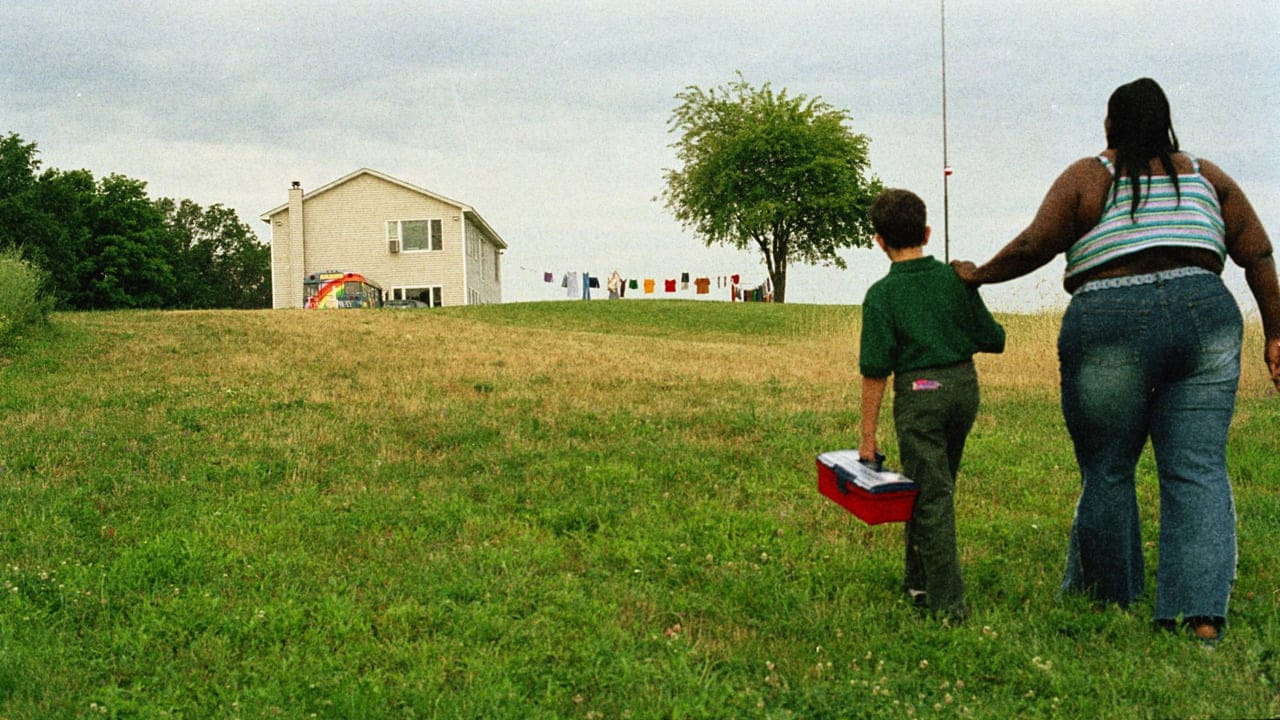

Having seen most of Solondz' films (including the tepid Storytelling and the frankly unfortunate Life During Wartime), I think Palindromes may be his second finest, after Happiness. It isn't as funny as Happiness, but it is also less judgmental of Western humanity than that film (a good or bad thing, depending on your perspective), and has plenty of other things going for it besides.Just about all I knew about Palindromes going in was that it was to some degree based on or inspired by Solondz' best-known film, Welcome to the Dollhouse. Unlike his more recent Life During Wartime, which fails because it tries (unconvincingly) to make too many various direct connections to its "prequel" Happiness, Palindromes is much less literal or obvious in those connections. Despite the occasional character reference to / recurrence from Dollhouse, it succeeds as an entirely separate and independent work, and one that I personally find much more sophisticated and interesting than the original that semi-inspired it.Unlike most of the IMDb reviewers here, I was also totally unaware of the "multiple Avivas" device going into the movie. Quite late in the film, once Solondz starts alternating his various Avivas within the same "chapter," I finally realized the multiple actresses playing Aviva were all intended to be representations of *the same character*. To that point, I'd viewed them as separate but effectively interchangeable characters simply sharing the same name, along with a handful of obvious motivations and personal connections (even the fact that they wore the same outfits didn't throw me a clue; I figured it was just an attempt at semi-opaque metaphor, or maybe just an interesting way of improving continuity).I felt pretty dumb about this when I got it all sorted, but perhaps I had been biased going in by the more disconnected vignettes that comprise Solondz' prior effort, the questionably uneven Storytelling. I ultimately think it was a good thing anyway, as it allowed me to experience additional layers of possible meaning that I know I would not have experienced had I known the full story throughout the film.Palindromes is much less about black humor than Solondz' '90s films, but it's not to say there aren't quite a few flinch-worthy funny moments. By far, the hardest stretch to sit through-- but also the most entertaining-- is the long chunk of Palindromes that takes place at the Sunshines' compound for disabled, brainwashed children. This interminable but wonderful chapter has some of the funniest / skin-crawlingest scenes involving kids that have ever been laid to non-documentary film (upping the ante, without the humor: the real kids interviewed in Jesus Camp).Mostly, Palindromes is a semi-realistic and touching art film about teen identity and sexuality, thankfully without the creepy quasi-pedo voyeurism of Larry Clark. There are plenty of moments where you'll find yourself shaking your head and saying "no" under your breath, but unless you live in the kind of permanent state of denial that would find you rooting for the likes of the Sunshine "family," it's an eminently watchable and moving film with an interesting and well-crafted linear narrative that comes together at just the right time.Palindromes deserves to be seen by more people, and I can see it being much more broad in its mainstream appeal than much of Solondz' earlier work. I really hope Solondz can find his way back to making films like this and Happiness in his future filmmaking.
... View MoreI'd like to comment on some aspects of the movie that I have not yet found anyone commenting on.While this movie is ostensibly from the perspective of a pre-teen girl who wants to be pregnant, the content of the film shows less of the perspective of a pre-teen, or any realities of life as a pre-teen in middle America, as it seems to assert, and more about the filmmaker's world view and life experience.I'll admit, this is the first film by Solondz that I've seen, and I hope to not watch any more, so my depth of understanding of him as a filmmaker is shallow.The film features three different sex scenes, all involving the 12 year old Aviva/Henrietta, the protagonist of the film. As you may have surmised from other reviews of this film, Aviva/Henrietta is played by 8 different actresses/actors in the course of the film. Each sex scene shows Aviva laying flat on her back, being "done to", absolutely emotionless and reactionless. The final sex scene takes it a step further and cycles through many of the actresses who played Aviva throughout the film, each of them with the exact same expressionless face. From my take on the film, each of these encounters were encounters that Aviva desired and maybe even initiated, including the one with the adult trucker with whom she was hitchhiking. And yet she was clearly absolutely absent from each of the experiences. The final sex scene with multiple actresses with the same expressionlessness seemed hugely important to me as insight into the filmmaker himself. I was hit with a sudden sense that this must be the filmmaker's experience: looking down on face after expressionless, void face. As I know nothing about the filmmaker other than this film and the reviews I've read of it, I'm not presuming to accuse him of anything about his life. I am saying that this scene led me to question whether the film was actually his fantasy about what the life and choices and motivations of young girls who he either has had sex with or has fantasized having sex with might be.Interestingly, only one scene clearly alludes to non-consensual sexual contact, and it's none of the sex scenes. When Aviva/Henrietta is at the Christian fundamentalist "Sunshine" house, she overhears the family doctor, who examined her while she was asleep when she first arrived at the house, telling the father of the household that she is a "child whore". To back up his assertion, the doctor hands the father what looks like a whole roll of photographs, presumably with images of Aviva/Henrietta's vagina. The father asks, "You examined her?" The doctor answers affirmatively. And the father looks intently at the photos, saying, "I've never had a slut in my house before." While there is clear hypocrisy in the Sunshine family's rabid pro-life stance which leads the father to hire hit men to kill abortionists, this hypocrisy seems to have been looked over by many reviewers. And what is Aviva's response? She runs away from the family that night, and one may at first believe that she's motivated by fear of violation by staying. But it's soon revealed that her motivation is to go with the hit man hired to kill the abortionist that she was forced to use by her mother because she believes she is in love with the hit man, who was the trucker she had sex with in the motel.This utter lack of fear exhibited by Aviva, not just in this scene, but throughout the film, is totally unbelievable and unrealistic. The film attempts to pull her character through the whole movie on two basic motivations: the desire to be pregnant, coupled with anger/hatred of abortion and her abortionist who foiled her first successful attempt at pregnancy. These motivations are too thin to carry her through the entire movie without any other emotions which would be reasonable given her circumstances. This, again, strengthens my sense that this movie is not about her at all. It's about someone else, likely the filmmaker, wanting this character to be something that is so severely disconnected from reality for his own purposes.
... View MoreA line that at once resounds everything that is uncomfortable about Todd Solondze and his work. Palindromes is a film whose bleakness is only matched by it's moments of uncomfortable hilarity. Solondz also expands his material a bit, this time out, by opting to show the same character through six different actresses (before "I'm Not There", and in the vein of "That Obscure Object of Desire"), with each actress representing a portion of our tragic heroins emotional geography. The film begins with the funeral of an earlier Solondz character, Dawn, from his first film "Welcome To The Doll House", having killed herself, a funeral attended by the young and impressionable heron of this film Aviva. Abortion is the central focus of the film, with neither side of the issue "winning" any argument, instead we are shown a girl named Aviva(her names a palindrome), who wants only to have babies to love and love her forever and ever. From this monstrously co-dependent springboard we get a tour through religious extremism and Laissez-faire middle class liberalism, at they're best and worst, and abortion in all of it's contradiction and paradox. Solondz by this film has defined himself as a pessimist, a definition which like a true pessimist he believes is unavoidable as palindromes themselves, the same both forward or backward, forever. Understandably, there are those who find Solondz too cynical; empty jaded misery mongering which gives us nothing of the beautiful and sublime we would expect from "true" works of art, which has always seemed to me a denial induced distortion of the medium and message. Because we don't like what is being said, we pay no attention to the skill with which it is being communicated, or the intricacies of it's phrasings. Solondz films are brutal, disturbing, and hilarious all at once, and it's a difficult mix, handling despair and comedy, and there simply isn't anyone who does it better Todd Solondz. Anyone can make an inappropriate comedy about abortion, just as anyone can make a disturbingly realistic look the subject, but few can dance back and forth across the boarders without loosing their footing like Palindromes. A more meaningful, if less enjoyable film than Happiness, but easily one of Solondz and the decades best.
... View MoreLet's get one thing perfectly straight before continuing in what is about to be a well-balanced and thorough beating-about-the-brow of this movie: There is literally *no* reason for anyone to watch this mess. It has been mentioned that the director, Todd Solondz, spent his *entire life's savings* to create this film, because no studio would back it. And why wouldn't those awful, money grubbing, corrupt SOBs back it?Why, because "Palindromes" is utter, festering drivel. Quite truly, its one redeeming quality is that it ends.Let us forget the fact that the main character is bewilderingly played by eight different actresses, that the cinematography is a step below what you'd expect to find on Youtube, and that the entire plot basically takes the audience on a snore-inducing non-adventure. What truly drives me to hate this movie is that not one single cast member can muster up the ability to actually act. I felt like I was watching cardboard cutouts with dumbstruck little faces scrawled on them.If there was ever supposed to be a deeper meaning to this rubbish, it was lost somewhere between Solondz's inner thoughts and what he actually ended up producing. There are people moving, talking, partaking in awkward sex scenes, and being shot to death, but when it's all said and done, there is truly nothing to be gleaned from this movie save for the ice-cold assurance that you just wasted an hour and forty minutes of your life.
... View More